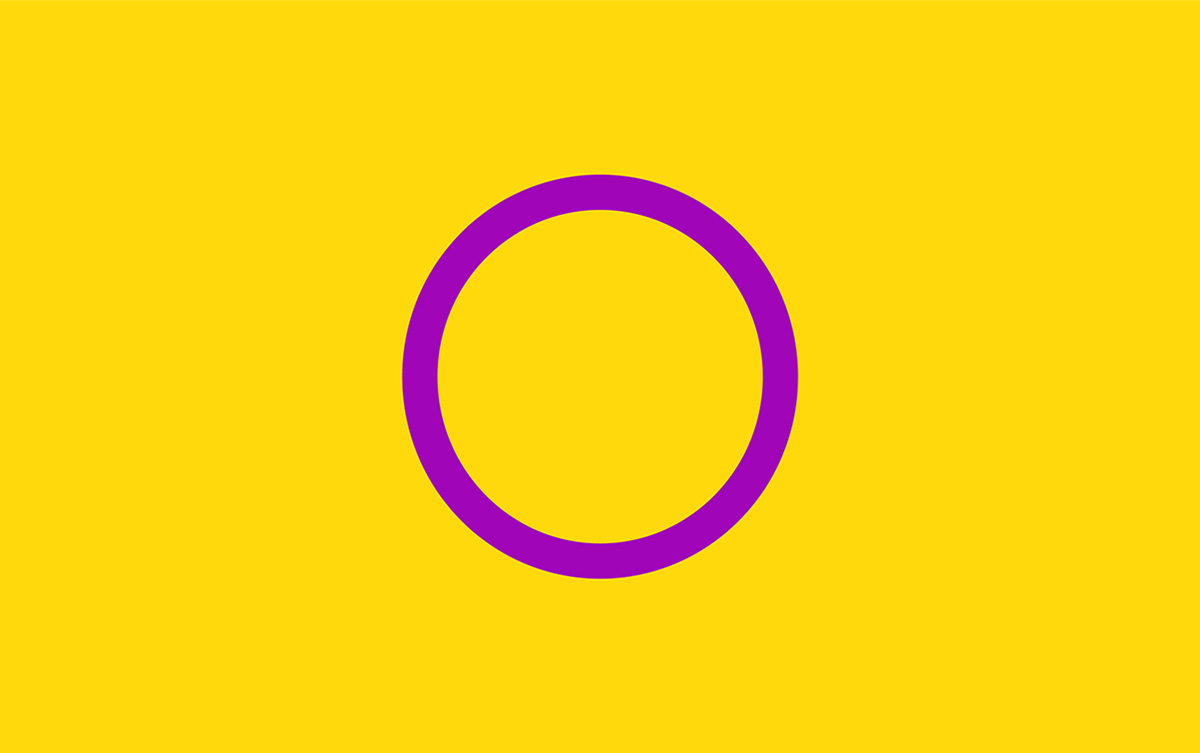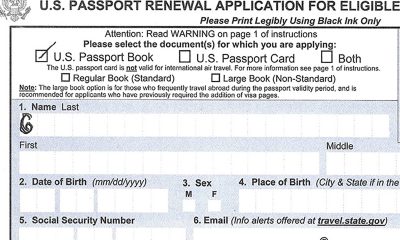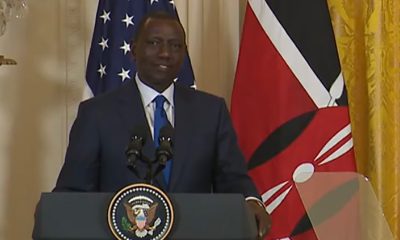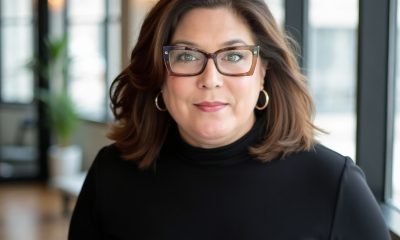Opinions
Breaking binaries and advocating for intersex justice in Southern Africa
Movement embraces intersectionality and affirms people’s multiple identities

A transformative movement is gaining momentum in Southern Africa, a region known for its diverse cultures and traditions. This movement challenges gender norms and advocates for the rights and dignity of intersex individuals. This article explores the vital concepts of breaking binaries and intersex justice in Southern Africa, where cultural nuances and a rapidly developing fierce spirit of activism reshape the landscape of gender diversity and sexuality.
The world is quickly changing, and with it comes an increasing recognition of the importance of diversity and inclusion. In the past, many people have looked at the world in terms of binaries — Black and white, male and female, homosexual and heterosexual. However, this way of thinking is limiting and does not reflect the diversity that exists in our communities. Breaking these binaries and embracing diversity and inclusion is crucial to creating a fair and equitable society by recognizing and protecting all these diversities.
Intersex intersectionality
Intersex justice is a social and human rights movement that advocates for the rights, dignity and well-being of intersex individuals. It is also a political movement making political statements since in the broader context of identity politics and the recognition that vulnerable and marginalized communities have historically been subjected to social, political and legal discrimination. When gender-diverse people dare to express their identities openly (and using the plural term for identity here intentionally because, using the theory of intersectionality, everyone has their own unique identities and experiences), it can be seen as a form of resistance and a statement against the systemic discrimination and oppression they may face.
Intersex people are born with variations in their sex characteristics that do not fit typical definitions of male or female. Intersex people often face stigma, discrimination, medical interventions without informed consent and societal violence. Inclusive binaries and intersex justice are significant issues in Southern Africa, as they intersect with the region’s traditional, cultural, social and legal aspects. In many parts of Southern Africa, intersex persons are often frowned upon, hidden or even believed to be a curse and killed.
As we work on intersex awareness, though annual commemorations such as #IntersexAwarenessDay, there is a solid need to reject stereotypes that lead to discrimination and prejudice. Breaking binaries embraces intersectionality and affirms that people have multiple identities that intersect and interact with one another.
Several Southern African customs have a long-standing relationship with gender and sex, associated with male and female and masculinity and femininity and there is no in-between; males are expected to masculinize, and females are supposed to feminize. The push for inclusive binaries challenges these traditional gender norms and promotes a more inclusive understanding of human diversity.
Gender norms and it has influenced societies
Gender norms have profoundly influenced Southern African societies, shaping cultural, social, and economic dynamics for centuries, and this has also impacted modern gender norms in our communities. Gender norms can be defined “as social principles that govern the behavior of girls, boys, women and men in society and restrict their gender identity into what is considered to be appropriate,” a definition also very limiting and binary based with little consideration and acknowledgement of the diverse gender spectrum.
Gender norms, a social construct, were often prescribed specific roles and responsibilities for men and women, and we have been inaccurately taught in history, moral education and social studies lessons in schools that in the past, men were traditionally seen as hunters, warriors and providers, while women were responsible for domestic tasks, childcare and subsistence farming.
These roles have reinforced gender-based inequalities in access to resources and economic opportunities that we experience today in a somewhat progressive modern society. Gender norms typically grant more decision-making power to men, and they often hold leadership positions within the community. This practice continues as men’s voices are prioritized in governance and social development matters, which has resulted in the exclusion of women from participating in important decisions that affect their lives and communities, and this is even worse for gender-diverse persons and they do not satisfy the bias “male” and “female” category.
The unequal power dynamics enforced by society’s gender norms have contributed to higher levels of gender-based violence. Domestic violence and harmful practices such as child marriage and female genital mutilation have persisted in some Southern African communities due to these norms. Intersex persons have not been spared from genital mutilation as some have undergone “gender reappropriation” surgeries as infants. There is a growing push in advocacy and legislative reform to protect intersex minors from unconsented gender surgeries as this is a choice that should be for them to make. The influence of gender norms has further influenced healthcare service delivery as sexual and reproductive health and rights development have been limited and not inclusive and accessible for intersex persons. This limitation has resulted in a lack of bodily autonomy for intersex people. Being gender-diverse has many excluded intersex people from essential fundamental health services such as family planning and mental well-being.
Another aspect influenced by gender norms is inheritance rights. Many African societies are built in a cisgender patriarchal system, and because of this, inheritance and property rights have been structured in a way that favored male heirs. This has often left women and girls without access to land and resources, making them economically vulnerable and dependent on male relatives.
The result of not conforming and fitting into mainstream male or female gender identity often left intersex persons excluded, facing stigma, discrimination and prejudice from various packets of society. Efforts are being made to raise awareness about intersex issues, promote inclusivity, challenge discrimination and prevent the invisibilization of intersex voices and identities. Intersex justice organizers work to ensure intersex individuals are recognized, respected and provided with the support and care they need while fighting against harmful practices and discrimination.
Efforts and promoting intersex rights and justice in Southern Africa
Promoting intersex rights and justice in Southern Africa has become an increasingly important focus for advocacy and human rights organizations in recent years.
Human rights organizations, such as the Southern Africa Litigation Center, are actively involved in legal advocacy for gender-diverse individuals and work to challenge discriminatory laws and practices, and supporting strategic litigation that promotes the rights of gender minority and gender-diverse people in Botswana, Eswatini, Lesotho and Zimbabwe.
Regional organizations such as Iranti and Gender DynamiX advocate and provide training and educational resources to healthcare professionals, religious and cultural leaders, policymakers, and the public. These advocacy initiatives aim to enhance understanding and sensitivity regarding intersex issues and collaborate with other human rights organizations to foster a more inclusive and accepting society.
Legal and policy developments on intersex rights in Southern Africa
Legal and policy developments related to intersex rights in Southern Africa have gained momentum in recent years, reflecting a growing recognition of the need to protect the rights of intersex individuals. Additionally, the Protocol to the African Charter on the Rights of Women, a progressive human rights instrument, requires state parties to take specific measures to end violence against women regardless of their sexual orientation or gender identity. Furthermore, the Protocol calls for the ending of genital mutilation and the promotion of bodily autonomy and reproductive health choices of women, including intersex women.
In South Africa, the Promotion of Equality and Prevention of Unfair Discrimination Act as amended in 2005 interprets the definition of “sex” to include intersex persons; therefore, intersex persons are protected from unfair discrimination, harassment and hate speech and promote equality for intersex persons.
In 2014, the African Commission on Human and Peoples’ Rights adopted Resolution 275, which protects against violence and other human rights violations against persons based on their actual or imputed sexual orientation and gender identity. Resolution 275 expresses grave concern about increasing violence and other human rights violations, including murder, rape and assault experienced by sexual and gender minorities. It calls upon states to stop such violence and take appropriate measures to ensure adequate remedies for victims.
Botswana made significant progress in 2017 by recognizing the rights of transgender and intersex individuals to change their legal gender markers on official documents. This ruling by the court was a crucial step towards recognizing the diversity of gender identities and would pave the way for the protection of gender-diverse persons. In many Southern African countries, such as Eswatini, Lesotho and Namibia, intersex persons can legally change their name and sex on birth certificates to suit their preferred gender identity per the national registration acts.
In 2022, the Zimbabwean government adopted two recommendations at the country’s Universal Periodic Review at the Human Rights Council on gender minorities, which were to protect intersex minors from unconsented operations surgeries and violations of bodily integrity and to strengthen efforts to address violence against women, children and all persons based on their sexual orientation and gender identity. Intersex advocacy groups in Zimbabwe have been working to raise awareness and challenge harmful practices. Following the adopted recommendations, there is an expectation to see an increase in dialogue between the government and human rights organizations on protecting intersex people’s rights.
In March this year, the African Commission on Human and Peoples’ Rights adopted Resolution 552, which seeks to promote and protect intersex rights on the African continent. Resolution 552 comes with clear recommendations for states to create administrative and legislative measures to protect intersex persons from violent harassment at home, school, the workplace and in the broader society. It calls on member states to ensure that members of their judiciary, immigration officials, law enforcement officers, healthcare and education practitioners, as well as traditional and religious communities, are sensitized to protect, respect and treat intersex people equally without discrimination or prejudice. It further calls for the recognition and protection of intersex movements and human rights defenders to organize without any threats and that perpetrators are tried and persecuted.
Intersex liberation is our liberation too
The fight for the recognition, protection, and inclusion of intersex people is an ongoing and essential human rights struggle. And while there has been progress, challenges still exist for intersex rights. It is necessary to continue advocating for the full recognition and freedoms of all intersex people, to protect their bodily autonomy and to ensure that they can live their lives with dignity and without discrimination.
Bradley Fortuin is the LGBTIQ+ Program Officer at the Southern Africa Litigation Center and a social justice activist.
This article is part of advocacy efforts on recommendations to the government of Botswana’s Universal Review of Botswana at the 43rd Human Rights Council. A joint submission Stakeholder Report was submitted by Banana Club,Black Queer DocX, Botswana Trans Initiative, Life|Loss|Love, Mmammati Human Rights Hub, Iranti, the Southern Africa Litigation Center and the Sexual Rights Initiative.
Opinions
Navigating employer-sponsored health insurance, care
One in four trans patients denied coverage for gender-affirming care

Even though 86% of transgender Americans have health insurance, one in four reported being denied coverage for gender-affirming care in the 2015 and 2022 U.S. Transgender surveys. These denials can occur when an insurance plan contains a categorical exclusion of gender-affirming care. It is important to note that transgender employees who receive insurance coverage through their employers are entitled to legal protections.
Employers are responsible for ensuring that the insurance plans they provide do not violate any laws, including anti-discrimination laws. In 1983, the Supreme Court ruled that under Title VII of the Civil Rights Act of 1964, employers are legally required to provide employees with equal pay and benefits, including health insurance. This protection now extends to transgender employees after the Supreme Court’s ruling in Bostock v. Clayton County (2020), which clarified that sex discrimination under Title VII includes gender identity discrimination.
Since Bostock, several transgender employees have successfully sued their employers for discrimination because they were denied coverage of gender-affirming care by their employers’ insurance. While employers can be held liable under Title VII, it remains unclear whether insurance companies will be held liable under Section 1557, the antidiscrimination provision of the Affordable Care Act (ACA), in the future.
Most—if not all—courts have ruled that employers can be held liable for choosing insurance plans with categorical exclusions of gender-affirming care. A categorical exclusion is when an insurance plan has a blanket ban of coverage for certain services. Although discrimination cases generally require proof of intent to discriminate, it is not required of transgender employees because categorical exclusions of gender-affirming care are facially discriminatory (i.e. the policy is explicitly and obviously discriminatory in nature).
In Kadel v. Folwell (2024), the Fourth Circuit court considered the Fourteenth Amendment, Title IX, and ACA claims in a consolidated case considering two state health plans: the State of North Carolina’s insurance plans for teachers and West Virginia’s Medicaid program. The Fourth Circuit court held that it is impossible to ban coverage of gender-affirming care without discriminating against transgender people because (1) gender dysphoria is a legitimate medical diagnosis which requires medically necessary treatment; and (2) the services provided under gender-affirming care are also provided to cisgender patients for other medical diagnoses. In short, there is sufficient evidence of discriminatory intent because categorical exclusions of gender-affirming care are facially discriminatory. Under Kadel, the Fourth Circuit also ruled that a policy does not have to explicitly exclude transgender patients. “Rewording the policies to use a proxy,” like sex changes or sex modification, is still facially discriminatory.
Along a similar vein, in Lange v. Houston County (2024), the Eleventh Circuit court found that the Sheriff’s Office’s categorical exclusion of gender-affirming care was a violation of Title VII. Agreeing with the reasoning in Kadel, the court cited a 1991 Supreme Court Case which ruled that proof of intent to discriminate is not needed for facially discriminatory policies. The court also held Anthem Blue Cross liable because third-party administrators in the Eleventh Circuit (i.e., Alabama, Florida, and Georgia) can be held liable as an employer if they make employment decisions as the authorized agent of an employer. However, this decision is unique to the said jurisdictions, and the liability of third-party administrators/insurance providers remains generally unclear. Moreover, the decision is not final because the court granted an en banc appeal, and a panel of all twelve judges re-heard the case in February 2025. The decision after re-hearing remains to be seen.
Recently, Executive Order 14168 and the EEOC’s motion to dismiss its lawsuit against Harmony Hospitality on behalf of a transgender worker prompted concerns over transgender employees’ ability to bring federal discrimination claims. While such concerns are understandable, there has yet been any mandate prohibiting the EEOC from issuing right to sue to transgender individuals. In other words, even if the EEOC may not investigate and file lawsuits on behalf of transgender individuals, it does not bar private parties from doing so. Ultimately, the executive branch alone does not have the power to make changes to the Constitution or any federal statutes. It is up to the legislatures to amend laws and the Constitution, and courts to interpret and rule on constitutionality.
Protections Against Discrimination by Insurers Under Section 1557 Remain Unclear
While employers can be held liable for categorical exclusions of gender-affirming care, employees may be less likely to find relief for legal claims against insurers regarding discrimination on the basis of gender identity. Since Bostock, courts have found insurers liable for denying coverage of gender affirming care under Section 1557 of the ACA, extending sex discrimination to include gender identity. Recent litigation surrounding Section 1557 and the new presidential administration may precede a change in this trend.
In May 2024, the Biden administration issued a final rule implementing Section 1557.It reversed the rule put forth by the Trump administration four years prior, which had revised the Obama administration’s interpretation of the statute. The Biden administration’s final rule defined sex discrimination to include discrimination on the basis of gender identity and sexual orientation. Additionally, under the new rule, a wider swath of insurers and third-party administrators that receive federal financial assistance would be subject to Section 1557.
However, in July 2024, a Mississippi District judge granted a nationwide injunction preventing the Department of Health and Human Services from enforcing the final rule’s prohibition of sex discrimination with respect to gender identity. Additionally, executive orders during the early days of the Trump administration, and guidance from the Department of Health and Human Services that followed, rescinded wide swaths of Biden-era guidance extending sex discrimination protections to include discrimination based on gender identity. It is not yet clear how the new administration’s position on Section 1557 will impact courts’ decision-making regarding insurer liability and the extent of sex discrimination provisions in relation to gender identity going forward.
As the recent history of Section 1557 demonstrates, executive actions may influence the implementation of statutory antidiscrimination provisions, but do not change the law itself. While employers continue to face liability for discrimination towards employees seeking insurance coverage of gender-affirming care under Title VII, some protections remain on less certain ground as the United States enters a new presidential administration.
Ting Cheung, Luke Lamberti, and Neha Sharma are with Sanford Heisler Sharp McKnight.
Commentary
A conversation about queers and class
As a barback, I see our community’s elitism up close

In the bar, on the way to its now-Instafamous bathrooms, there’s a sign that reads, “queer & trans liberation means economic justice for all.”
I remember seeing that sign the first week the bar opened, and ever since I often find myself reflecting on that message. I stand fully in agreement. That’s why laws protecting queers in the workplace are essential, for far too often we are targeted otherwise. It’s also why I love working at the bar, since it provides opportunities for queers from all over the spectrum to earn a living. At a time when I gave myself space to pursue art, it was the bar that enabled me to do so.
It’s one thing to support the LGBTQ community in spirit, but that spirit means jack in a capitalist society if viable economic opportunities don’t exist. Speaking of jack, there’s a fellow barback named Jack who I fangirl over often. Jack is a decade younger than me, but damn I wish I had his sex appeal at his age (or any age, for that matter). He also has a mustache that easily puts mine to shame.
Jack not only agrees but took things one step further. “Economic inequality IS a queer issue,” he told me, “especially as we move into the most uncertain period of American politics I have ever lived through, it is apparent our identity is now a fireable offense.”
Uncertain is right. We’re fresh off the heels of a trade bonanza, one caused for literally no reason by our current commander in chief. Yet there emerged a strange division when discussing the trade war’s “unintended” consequences. For working class comrades like Jack and myself, we’re stressed about increasing prices in an already tough economy. But the wealthier echelons of our country had something else on their mind: the spiraling stock market. This alone highlights the story of our economic divide, where the same event produces two separate concerns for two distinct classes.
This is not to say the stock market is not important, but sometimes the media forget many Americans don’t own stock at all, including a vast majority of people between 18 and 29. In fact, according to Axios, the wealthiest 10 percent of Americans own 93 percent of the entire stock market, with the richest 1 percent holding $25 trillion — that’s right, trillion with a “t” — in market value. So, when the president reversed course on trade, it was less about high prices hurting everyday Americans and more about the dent created in the wealth of the wealthiest. And I’ll admit: that bothers me a lot.
If there is any takeaway from Trump’s trade war, it should be this: Economic inequality is the highest it has been in decades and, if left unchecked, will destroy the fabric of our country. We are steadily moving toward oligarchy status—if we’re not there already, that is—and it seems to grow worse with each passing year and administration. But in a city of D.C. gays who often skew corporate, I wonder: Are we all on the same page here?
After becoming a barback, I have my doubts. From questions about what else I do, to comments encouraging me to work hard so that I can be a bartender one day, I quickly learned the gay world is not too fond of barbacking. Barebacking, sure, but not barbacking. And hey, I get it—we’re not the alcohol hookup at the bar. Still, we are part of the service industry, and while some people are incredibly kind, you’d be surprised at how many turn up their noses at us, too.
Recently, I’ve come to realize my class defines me as much as my orientation does, if not more. Naturally, when you come from a rough neck of the woods like I do, it’s easy to feel out of place in a flashy city like D.C., which Jack noticed, too. “Anyone from a working class background could testify to that,” he said. “I don’t really know anyone from true upper class backgrounds, but I’d imagine their experience is one that leans into assimilation.”
Assimilation is a key word here, for admittedly gays love to play with the elite. Often, we don’t have children, meaning more money for the finer things in life, but that also means we may not think about future generations much, either. I’ve written before that our insecurity growing up has us ready to show the world just how powerful gays can be—power that comes in trips to Coachella and Puerto Vallarta, or basking in the lavish houses and toys we own. There’s already a joke that gays run the government, and corporate gays kick ass at their jobs as well. So, given the choice between fighting inequality and keeping a high-paying job, I must admit I have a hard time seeing where D.C. gays stand.
Admittedly, it worked out in our favor before, given that many corporations catered to our economic prowess over the years. But look at what’s happening now: Many corporations have kicked us to the curb. Protections are being stripped from queers, particularly for our trans brothers and sisters. Law firms are bowing down to Trump, offering hundreds of millions in legal fees just for their bottom line. All of this will hurt both queers and the working class in the long run, so again I ask: Corporate gays, where do you stand? Because if you remain complicit, that’s bad news for us all.
I don’t want to sound accusatory, and I hate being a doomsday type, so allow me to end this on a better note. Strength is not about celebrating when times are good. Arguably, true strength emerges when times get tough. These are tough times, my friends, but that also makes now the perfect opportunity to show the world just how strong we are.
At a time when the world is pressuring us to turn our backs on each other, we must defy them to show up when it counts. Corporate gays—now more than ever, at a time when the economy is turning its back on queers, we need you. We need you to stand up for the queer community. We need you to make sure no one gets left behind. We need you to show up for us, so that we can show up for you, too.
Ten years ago, the economy didn’t turn queer out of nowhere. The economy turned queer because we made it turn queer.
And if we did it once, surely we can do it again.
Jake Stewart is a D.C.-based writer and barback.
Opinions
On Pope Francis, Opus Dei and ongoing religious intolerance
Argentine-born pontiff died on Monday

“Good Friday” set the stage for Saturday’s anti-Trump/MAGA “Hands Off” protests serving as a timely lead-in to binge-watching Alex Gibney’s two-part HBO political documentary, “The Dark Money Game” on Easter Sunday. In “Wealth of the Wicked,” nefarious Opus Dei —Svengali Leonard Leo strategically seduces politically disappointed Catholic Federalist Society billionaires into subsidizing a scheme to ‘pipeline’ malleable conservative judges to take over the Supreme Court and overturn reproductive rights.
A key victory for “Operation Higher Court” came in 2010 when SCOTUS ruled 5-4 in Citizens United v Federal Election Commission, that corporations and unions have the same First Amendment free political speech rights as individuals — as long as their unlimited cash donations go to 501 c(4)’s or Super PAC slush funds and not directly to candidates. Twelve years later, in 2022, they got their payoff with the overturning of Roe v Wade by Leo-promoted Catholic justices.
But Leo’s political conniving is not the only exploitation of moral corruption. The documentary exposes conservative Christians too.
Gibney’s anti-hero is a former rabid anti-abortion lobbyist named Rev. Robert Schenck. He tells of turning to a fellow conservative in Cleveland, Ohio after Trump won the Republican presidential nomination in 2016 and asking: “Are we really going to do this? We’re going to choose this man who’s inimical to everything we believe?” The other evangelical replied: “I don’t care how bad he is. He’s going to get us the court we need.’”
Schenck explains the unholy alliance between Christian conservatives and Big Business. “Whenever you talked about government regulation, the argument was eventually — ‘these same characters who control my business are going to start trying to control your church. So, it’s in your best interests that we defang this monster’ — and that brought a lot of religious conservatives over.”
And there’s this: “We have a little aphorism built on a Bible verse: ‘The wealth of the wicked is laid up for the righteous.’ So, yeah, let’s baptize the billionaires’ money. We can do that — and it eventually brought together this alliance.”
Schenck later reveals an intense epiphany that resulted in regret for how much harm he caused. Not so for Leo.
This is an excerpt from Gareth Gore’s comprehensive book Opus, for Rolling Stone Magazine:
“DURING THE DONALD TRUMP YEARS, conservatives — led by Leonard Leo — took control of the Supreme Court … At one Federalist Society event, his good friend Supreme Court Justice Clarence Thomas jokingly referred to Leo as the third most powerful man in the world, presumably behind the pope and the president of the United States.”
On Monday morning, Pope Francis died. I liked this pope, compared to the others. I covered Creating Change during the AIDS crisis when author Paul Monette delivered his brilliant, scathing denouncement of the Catholic Church, then unexpectedly ripped up a portrait of Pope John Paul II. Pope Benedict XVI was just crotchety cruel. But Pope Francis — named for St. Francis of Assisi — had that big smile and genuinely seemed to care about migrants, the vulnerable and the marginalized — like us. He even used the word ‘gay’ instead of ‘homosexual.’
Pope Francis’s reply to a question about a Vatican “gay lobby” on a flight from Rio de Janeiro to Rome made global news. “If a person is gay and seeks God and has good will,” he said in 2013. “Who am I to judge? We shouldn’t marginalize people for this. They must be integrated into society.”
What did this mean? Welcoming inclusion into a family that officially considers us ‘intrinsically disordered?’
And then there was Pope Francis’s interaction with Juan Carlos Cruz — a whistleblower in Chile’s clerical sex abuse scandal.
“He said, ‘Look Juan Carlos, the pope loves you this way. God made you like this and he loves you,'” Cruz told The Associated Press.
Meanwhile the Catholic Church Catechism affirmed, “this inclination, which is objectively disordered, constitutes for most of them a trial.”
Ergo, a behavioral choice.
Therein lies the problem.
LGBTQ people are seen largely as individuals with sinful same sex sexual ‘inclinations.’ So when the pontiff touted ‘the equal dignity of every human being,’ and rebuked Vice President JD Vance with the ‘Good Samaritan’ parable, whereby love “builds a fraternity open to all, without exception” — we are still the exception.
Francis was all also human — having to apologize at one point for using a gay slur. But what of the bigger things like, did he know about the Opus Dei takeover of the U.S. Supreme Court when he chastised Vance about deporting migrants? Did he know that the Archdiocese of Los Angeles agreed to pay $880 million to 1,353 people last October, who allege they were victims of clergy sexual abuse? With a previous payment of $740 million, the total settlement payout will be more than $1.5 billion dollars. Is Leo chipping in to replenish that?
And it’s not over. Earlier this month, Downey Catholic priest Jaime Arriaga, 41, was charged with several counts of child sexual abuse which allegedly happened when he was serving as a transitional deacon at the Our Lady of Perpetual Help Church.
Longtime U.K LGBTQ+ activist Peter Tatchell — who’s campaigned against Catholic homophobia for 58 years — says Pope Francis’ legacy is complicated.
“I extend my condolences to Catholics worldwide on the passing of Pope Francis. While we often disagreed on issues of LGBTQ rights, I acknowledge his more compassionate tone towards sexual minorities. His recent moves to allow blessings for same-sex couples, albeit with limitations, signaled a small but significant shift in Church doctrine,” Tatchell said in a statement.
“However, for millions of LGBT+ people globally, the Catholic Church remains a force for discrimination and suffering. Under his leadership, the Vatican continued to oppose same-sex marriage and trans rights. Catholic bishops lobbied against the decriminalization of homosexuality in many parts of the world. The Vatican still upholds the homophobic edicts of the Catechism, which denounces the sexual expression of same-sex love as a ‘grave depravity’ and ‘intrinsically disordered.’ Francis’s legacy is, therefore, a mixed one — offering some progress, but leaving deep-rooted inequalities largely intact.
“The struggle for LGBT+ equality against a homophobic church must continue. We urge the next Pope to go further — to end the church’s support for discrimination, both within the faith and in the wider society.”
-

 Federal Government5 days ago
Federal Government5 days agoHHS to retire 988 crisis lifeline for LGBTQ youth
-

 Opinions5 days ago
Opinions5 days agoDavid Hogg’s arrogant, self-indulgent stunt
-

 District of Columbia4 days ago
District of Columbia4 days agoD.C. police seek help in identifying suspect in anti-gay threats case
-

 Virginia5 days ago
Virginia5 days agoGay talk show host wins GOP nom for Va. lieutenant guv











